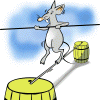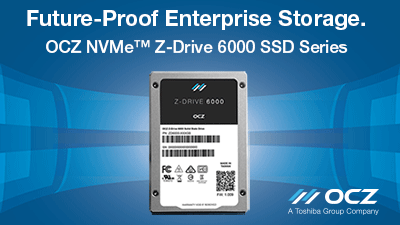|
|
|
|
|
|
 | ||||||
| .. | ||||||
| ||||||
| .... | ||||||
| ||||||
.. | ||||||
| ||||||
.. | ||||||
|
| ||||||
Who's who in SSD? - Toshiba by Zsolt Kerekes, editor StorageSearch.com - January 2017 As a primary supplier of flash memory Toshiba has been involved in the industrial SSD market since that market began. But Toshiba didn't enter the SSD market with its own products until the 1st quarter of 2008 at which point Toshiba entered the Top SSD Companies List. Toshiba entered the enterprise SSD market in 2009 with a range of SAS SSDs. Toshiba's appearance in the 2.5" NVMe SSD market in 2016 was due to the rebranded product line from OCZ. | ||||||
|
| ||||||
Toshiba - selected mentions from SSD Market History In May 2008 - Toshiba acquired approximately $30 million of shares in Mtron. In September 2008 - Toshiba sampled a 256GB 2.5" SATA MLC flash SSD with R/W speeds of 120 / 70 MB/s. In December 2008 - Toshiba said it will sample a new family of MLC flash SSDs with 256GB capacity in 2.5" and 128GB capacity in 1.8" form factors in Q1 2009. In January 2009 - Toshiba announced it will start volume production of dual port SAS SLC flash SSDs in Q2 2009. The 2.5" SSDs will have 100GB capacity, and 25,000 read IOPS, and 20,000 write IOPS. One of the enabling factors for the high write IOPS is the use of a non-volatile cache - which was predicted in StorageSearch.com's article - the Flash SSD Performance Roadmap. This brings the number of oems who have announced SAS SSDs to 6. See SSD Buyers Guide table for the full list. In May 2009 - Toshiba announced it is offering 512GB SSDs as an option in notebooks for the Japanese market. The new, Toshiba-developed 512GB SSD employs a 2-bit-per-cell MLC flash memory - which gives 4x the capacity of SLC flash used in industrial and enterprise SSDs for the same silicon wafer footprint. One of the failures of the SSD market in 2008 was the low performance of SSDs integrated in notebooks. Toshiba's new notebook seems to address that market failure . The company says its new SSD controller boosts data throughput figures of 230MB/s reads and 180MB/s writes. In September 2009 - A report in DIGITIMES said that Toshiba has ordered flash memory card controllers from ITE Tech to diversify its supplier base. In January 2010 - Toshiba announced it is sampling 128GB mSATA MLC SSD modules (30mm x 50.95mm x 4.75mm ) aimed at the netbook PC market. Sequential R/W speeds are 180MB/s and 70MB/s respectively. Weight is 9g. In April 2010 - Violin Memory announced it had received a significant investment from Toshiba. In April 2011 - Toshiba announced it was sampling SmartNAND - 24nm flash memory chips (with upto 64GB capacity) with integrated ECC controllers to simplify the design of consumer products which need storage. In January 2013 - Toshiba started sampling a new range of 2.5" SAS MLC SSDs - with self encrypting security features and on board sanitization. In October 2013 - DensBits announced that it has licensed its advanced Memory Modem technology (a variety of adaptive R/W and DSP flash controller IP) to Toshiba for use in new designs of SSDs. In November 2013 - OCZ announced that it would file for bankrupty and also said it had received an offer from Toshiba to acquire substantially all of its assets. In January 2014 - Toshiba confirmed it had acquired the SSD product lines and assets of OCZ. In January 2015 - Toshiba showed a prototype of the world's first PCIe single package SSD - with up to 256GB in a single BGA package. In March 2015 - Toshiba sampled the world's first 48-layer 3D stacked 2 bit nand flash memory in 16GB chips. In May 2015 - Toshiba demonstrated a hybrid storage drive which combined HDD and flash in a 3.5" form factor with an Ethernet interface. In July 2016 - Toshiba said it was sampling 64 layer 3D TLC flash in a 32GB device. | ||||||
| . | ||||||
| ||||||
| . | ||||||
| |||
| .. | |||
| |||
| .. | |||
 | |||
| .. | |||
| |||
.. | |||
| |||
.. | |||
| |||
. | |||
| |||
. | |||








